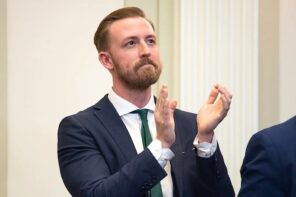“We are different from previous generations of conservatives. We are no longer working to preserve the status quo. We are radicals, working to overturn the present power structure of this country.”—Paul Weyrich quoted in John Soloma’s Ominous Politics: The New Conservative Labyrinth
For most Americans, the death of Paul Weyrich will not resonate; after all, most Americans have probably never heard of the man. He wasn’t a dashing celebrity, a sports star, a captain of industry, or a prominent public political figure; he wasn’t a regular guest on the premier talking-head TV programs; he never held elected office; there was no hint of a Ted Haggard/Newt Gingrich-like “values” scandal in his life. But Weyrich, who died after a long illness on Thursday, December 18 at the age of 66, and who wasn’t reticent about sharing his ideas and opinions, was, in fact, the connective tissue of the modern conservative movement.
In his book, With God on Our Side: The Rise of the Religious Right in America, William Martin pointed out that after Weyrich came to Washington in the late 1960s, he “received a revelation [about] how he might accomplish his dream [bringing together working-class Catholics and evangelical Protestants] when he attended a political strategy session run by liberal operatives.”
Although Weyrich hadn’t been invited to the confab—and to my knowledge he never revealed how he got there—Martin’s book quoted him as saying that “there before my eyes was revealed the modus operandi of the left:”
They had all these different groups, including religious groups, networking with people on the Hill, formulating strategy for offering amendments, and then executing that strategy with media, with demonstrations, with lawsuits, with studies, with political action, by targeting people—all the different elements of the political process.
Weyrich acknowledged that from that moment on, his life was “changed”: He spent the early part of the 1970s working “to get these people who really have the same morals, who have the same ideals, but who came to it from different traditions to work together.”
For nearly forty years, Weyrich contributed his ideas, organizational acumen, and fundraising skills to help build what evolved from an undisciplined gaggle of organizations that made up what was loosely called the New Right in the 1970s to the powerful political movement (although somewhat weakened after the recent election of Barack Obama) that it is today. Before there was a Heritage Foundation, a Moral Majority, a Ronald Reagan presidency, and before the so-called Republican Revolution of 1994, Weyrich had his eyes on the prize: steadfastly working to figure out how conservatives could regroup and rebuild from the ashes of the overwhelming defeat suffered by Senator Barry Goldwater in the 1964 presidential election.
Weyrich, labeled an anti-Semite for repeating the blood libel that “Christ was crucified by the Jews,” back in 2001, nevertheless had an extraordinary list of accomplishments: He “started out as a newspaper and radio reporter, then worked as an aide to Colorado’s Republican senator, Gordon Allott, before plunging into politics,” James Ridgeway and Alicia Ng wrote of his background in a September 2006 interview with Weyrich that focused on his opposition to The Patriot Act. “He set up the Heritage Foundation by persuading the Coors family to finance the venture. Later, he went on to help found the Moral Majority [Weyrich apparently offhandedly coined the name and it stuck] with Jerry Falwell; The American Legislative Exchange Council, a group pushing conservative ideas among state legislators; the Conservative Digest; and the Free Congress Foundation.”
Weyrich had been described by The Economist as “one of the conservative movement’s more vigorous thinkers”; he was voted three years in a row from 1981-1983 by readers of Conservative Digest as one of the top three “most popular conservatives in America not in Congress”; he had been named by Regardie’s Magazine as “one of the 100 most powerful Washingtonians”; he contributed op-ed pieces to the New York Times, Washington Post and Wall Street Journal and was a regular contributor to the Washington Times.
Weyrich, and a handful of other leaders (Richard Viguerie, the guru of direct mail, and Howard Philips, head of the poverty program in the Nixon administration) and philanthropists (William Simon), effectively argued that in order to build a conservative movement that would help (and guide) the political transformation of the country, there had to be an infrastructure that would make those changes possible. They were disillusioned by the fact that their project might take decades to coalesce.
Conservatives used the seventies, and the ensuing decades, to build institutions, finance them, and create a conservative vision: advocating building the military and a muscular foreign policy; supporting free-market economics including deregulation, privatization and tax cuts for the wealthy, and getting aboard the so-called family-values bandwagon.
Liberty University Chancellor Jerry Falwell Jr., son of the late Jerry Falwell, recognized that Weyrich had been “a pioneer of the religious right and the Reagan revolution.”
“He was one of the first to recognize that a coalition of people of faith was needed to protect traditional family values, the rights of the unborn, and the existence of the state of Israel,” Falwell Jr. said after Weyrich’s death. “He hosted many Liberty University students and interns at high-level political events in Washington, exposing them to the political process and teaching them how to become part of it. I met many of our nation’s political leaders when I attended some of those events as a college student in the early 1980s. Paul Weyrich will be greatly missed by conservative Christians across this nation. He worked tirelessly behind the scenes to advance the conservative agenda.”
Grover Norquist, president of the anti-regulatory conservative Americans for Tax Reform, said “Ideas alone do not have consequences. Ideas, even—or especially—powerful ideas are like seeds. If they land in fertile soil and are cultivated, they can grow. On rock or sand or ignored or tended by incompetents, they die. The idea of individual liberty and a limited constitutional government has been around a long time. Liberty doesn’t need new ideas to advance, but institutions to give muscle and skeletal structure to a political movement for liberty. That is how Paul Weyrich changed the world for the better.” Norquist added that Weyrich “brought leaders of various freedom impulses together. Most of the successes of the conservative movement since the 1970s flowed from structures, organizations, and coalitions he started, created, or nurtured.”
The Rev. Louis P. Sheldon of the Traditional Values Coalition also noted that Weyrich was a “pioneer of the conservative movement and a staunch defender of traditional values. He was a brilliant strategist, an aggressive defender of the faith, and a determined foe against the failed philosophy of liberalism. Most of all, he was a good friend, confidant, and someone who could be relied upon to do the right thing for our nation and for the Christian faith, which he embraced. We will miss him—and the conservative movement has lost a giant whose influence will be felt for years to come.”
In an e-mail, Manny Miranda, chairman of the Third Branch Conference, noted that there had been “no one—no one person—who has been more significant to the daily life of the conservative movement than Paul Weyrich. There has been no one who better understood the full range of issues that affect Americans or which are affected by Washington… I might not have succeeded in opposing the Harriet Miers nomination without Paul’s support. And I would certainly not have continued as a public advocate without his friendship. This was a truly great man, who overshadowed all the elected leaders who occupied the same time and space that he did.”
In a column earlier this month in the Washington Times, Weyrich wrote: “When pundits are asked to name the best presidents of the 20th century, Harry S. Truman’s name always comes up. That is interesting because when he left office in 1953 he had even lower approval ratings than President Bush now has… How will history judge Mr. Bush? Many of us won’t be alive when the first verdict is in.”
His last open column, dated Thursday at the Free Congress Foundation, the organization he founded and was CEO of was titled: “The Next Conservatism, A Serious Agenda for the Future.” Weyrich wrote: “It was the best of times. It was the worst of times. It is the worst of times because millions of Americans are unemployed this Christmas. It is the worst of years because we have mortgaged the future of our children and grandchildren for decades to come. It is the worst of years because many good friends have left us. It is the best of times because we still live in the greatest nation on earth. It is the best of years because we have the freedom to speak our minds. It is the best of years because we can organize as we see fit to support the political candidates of our choice.”
Frederick Clarkson, a longtime observer of and writer about right-wing movements, pointed out that Weyrich “was a catalyst for pulling together the disparate parts of the conservative movement into a fighting force. They are going to miss his strategic genius and the sheer force of his personality in getting things done.”
Does the rise of the modern conservative movement owe it all to Paul Weyrich? Not all. Will it survive without him? Yes it will. His most important contribution to the conservative movement may be that because of his work, the movement is unlikely to fade into obscurity. The organizations he helped build will be a lasting reminder of how much he contributed to changing America’s political landscape.
To read another Weyrich eulogy, see Max Blumenthal’s take at the Huffington Post.



